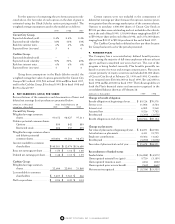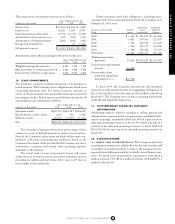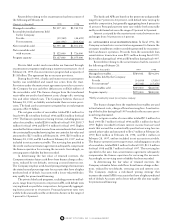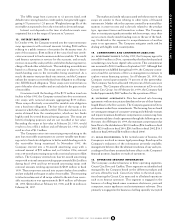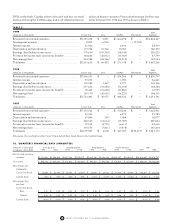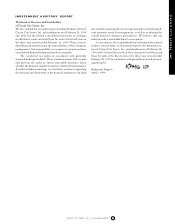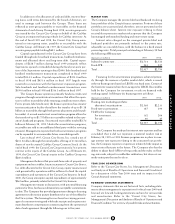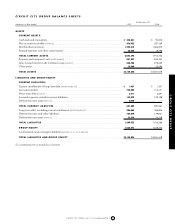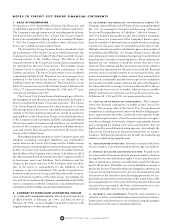CarMax 1999 Annual Report Download - page 49
Download and view the complete annual report
Please find page 49 of the 1999 CarMax annual report below. You can navigate through the pages in the report by either clicking on the pages listed below, or by using the keyword search tool below to find specific information within the annual report.
1999, the consumer electronics industry remains highly competi-
tive. Circuit City’s primary competitors are large specialty, dis-
count or warehouse retailers with generally lower levels of service.
Because of Circuit City’s long history of providing exceptional
customer service, management believes that the Circuit City loca-
tions can continue to maintain share in existing markets and build
comparable shares in new markets.
SALES BY MERCHANDISE CATEGORIES
Fiscal 1999 1998 1997 1996 1995
TV............................... 18% 18% 18% 17% 19%
VCR/Camcorders........ 13% 13% 14% 13% 14%
Audio........................... 16% 17% 18% 19% 22%
Home Office ............... 27% 25% 24% 26% 20%
Appliance .................... 15% 15% 15% 14% 15%
Other .......................... 11% 12% 11% 11% 10%
Total ............................ 100% 100% 100% 100% 100%
The Group sells two extended warranty programs on behalf of
unrelated third parties that issue these plans for merchandise sold
by the Group and other retailers. These third-party programs are
sold in most major markets. In states where third-party warranty
sales are not permitted, the Group sells a Circuit City extended
warranty. Gross dollar sales from all extended warranty programs
were 5.4 percent of the Group’s total sales in fiscal year 1999, com-
pared with 5.5 percent in fiscal 1998 and 6.0 percent in fiscal 1997.
The lower percentages in fiscal years 1999 and 1998 reflect the
impact of lower average retail prices on consumer demand for the
related warranties in many categories and increased sales of some
products that carry lower warranty penetration rates. Total
extended warranty revenue, which is reported in the Group’s total
sales, was 4.6 percent of sales in fiscal years 1999 and 1998 and 5.1
percent of sales in fiscal year 1997. The gross profit margins on
products sold with extended warranties are higher than the gross
profit margins on products sold without extended warranties.
Third-party extended warranty revenue was 4.1 percent of the
Group’s total sales in fiscal year 1999 and 3.6 percent of the Group’s
total sales in fiscal years 1998 and 1997. The fiscal 1999 increase in
third-party extended warranty revenue reflects the conversion of
stores in 10 states to third-party warranty sales in June 1998.
SUPERSTORE SALES PER TOTAL SQUARE FOOT
Fiscal
1999 ..................................................................................... $514
1998 ..................................................................................... $478
1997 ..................................................................................... $499
1996 ..................................................................................... $577
1995 ..................................................................................... $584
SUPERSTORE SALES PER TOTAL SQUARE FOOT.
Over the last
five years, the Group has significantly increased the percentage of
store square footage devoted to selling space. In fiscal 1995, the
Group introduced the larger format “D” stores in some markets.
These stores are intended to generate high sales volumes in spe-
cific trade areas but lower sales per total square foot than smaller
Superstores. These stores and the declines in comparable store
sales produced lower Superstore sales per total square foot in the
period from fiscal 1996 through fiscal 1998. The fiscal 1999 sales
per square foot increase primarily reflects the comparable store
sales increase.
IMPACT OF INFLATION.
Inflation has not been a significant con-
tributor to the Group’s results. In fact, during the past two years,
the average retail price has declined in virtually all of the Group’s
product categories. Although new product introductions could
help reverse this trend in selected areas, management expects no
significant short-term change overall. Because the Group pur-
chases substantially all products in U.S. dollars, prices are not
directly impacted by the value of the dollar in relation to other
foreign currencies, including the Japanese yen.
Digital Video Express
Digital Video Express has developed and is marketing a new digi-
tal video system for watching movies at home. Circuit City
Stores, Inc. holds the majority interest in the business. The
remaining interest is held by the prominent Los Angeles law firm
Ziffren, Brittenham, Branca &Fischer. The Company’s investment
in Divx is allocated to the Circuit City Group. Through the end of
fiscal 1999, the Company had invested $207 million in Divx,
$120 million of which was invested in fiscal 1999. The investment
in Divx impacts the Circuit City Group’s gross profit margin and
selling, general and administrative expense ratio.
Cost of Sales, Buying and Warehousing
The gross profit margin was 24.3 percent of sales in fiscal 1999,
24.6 percent in fiscal 1998 and 24.0 percent in fiscal 1997. The
lower gross margin in fiscal 1999 reflects the strength of the per-
sonal computer business, which carries lower gross margins; the
continued highly competitive price environment for the Circuit
City business; and costs associated with Divx. Better inventory
management and increased sales of new technologies and more
fully featured products partly offset these factors. The Group
gradually has reduced its assortment in a variety of product cate-
gories to more closely match consumer demand and has carefully
managed product transitions, especially in the personal computer
business. As a result, mark-downs have decreased, reducing their
impact on the gross margin. Excluding Divx, the gross margin for
the Circuit City business was 24.4 percent of sales in fiscal 1999.
Because Divx was not selling any product in fiscal 1998 and fiscal
1997, it had no impact on gross margins in those periods.
Selling, General and Administrative Expenses
Selling, general and administrative expenses were 21.2 percent of
sales in fiscal 1999 compared with 21.5 percent in fiscal 1998 and
20.4 percent in fiscal 1997. The improved ratio in fiscal 1999 pri-
marily reflects the expense leverage gained from the comparable
store sales increase, partly offset by selling, general and adminis-
trative expenses related to Divx. Operating profits generated
by the Group’s finance operation are recorded as a reduction to
the selling, general and administrative expenses. Excluding Divx,
the expense ratio for the Circuit City business was 20.1 percent
in fiscal 1999, 21.1 percent in fiscal 1998 and 20.2 percent in
fiscal 1997.
Interest Expense
Interest expense was 0.2 percent of sales in fiscal 1999 and 0.3 per-
cent of sales in fiscal 1998 and 1997. Interest expense was incurred
CIRCUIT CITY GROUP
CIRCUIT CITY STORES, INC. 1999 ANNUAL REPORT 47





